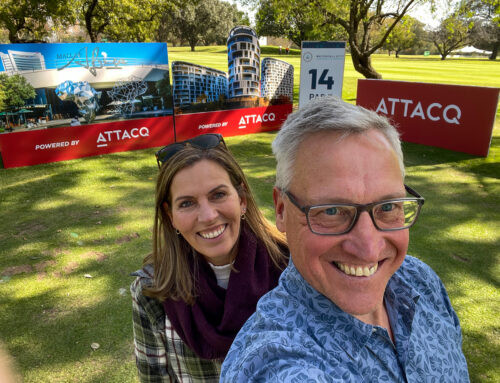The Mildenhall way
By Louis Eksteen
Jonathan Mildenhall, VP of Global Advertising Strategy and Creative Excellence at the Coca-Cola Company is fresh from one of Coke’s biggest years at the Cannes Lions International Festival of Creativity. In June the company was awarded the prestigious title of Creative Marketer of the Year at the festival, something Mildenhall has strived for since he joined the beverage group six years ago.
A proper ad man through his experience at a range of UK shops, including Bartle Bogle Hegarty, McCann, Howell Henry Chaldecott Lury, TBWA and Mother, Mildenhall was offered the opportunity to join Coke during a call from headhunters Heidrick & Struggles in 2006. “This job’s been better than I could ever have dreamed,” he enthuses during our interview at Coca-Cola South Africa HQ earlier this week.
Relaxed after he and colleague Ivan Pollard (VP Global Connections at The Coca-Cola Company) delivered their Cannes presentation to an appreciative local audience, Mildenhall says: “I never had the entrepreneurial drive to set up my own thing. I respect entrepreneurs so much. They have a genetic coding that I don’t have.
“The appetite for the kind of fundamental risk to mortgage your house to set up a business I just never had. But I knew I wanted to make a big impact on the advertising industry. I knew that I could create value for the advertising industry at large,” he explains.
“The path that I chose to do that was to become a client,” Mildenhall elaborates. “I wrote a letter to myself that stated in two years’ time I will be global head of advertising at a big advertiser, hopefully on teenage brands and with a little bit of luck I’ll be living in America. I always tell everybody dream big, because my goodness, your dreams can become true.”
Lately it’s his push to use content as the driver of Coke’s marketing communication that has earned Mildenhall his status as the advertising world’s change agent du jour.
Engagement versus disengagement
Content and content-related engagement is crucial for marketers, says Mildenhall. But over-engagement by companies can be a major turn-off. “I am particularly concerned about the bombardment of messages, especially on mobile phones, that could have the effect of consumers becoming disengaged from everything. Such an abusive misuse of data and an overuse of opportunities to engage can lead to disengagement.
He explains engagement has therefore never been more important. “But every time we take a look at any piece of content, any marketing plan, any promotion, we ask ourselves: Does this have a positive impact on the consumer that engages with this? If it doesn’t, I don’t want us to do it,” he says.
Conversation and storytelling
Mildenhall notes that since he’s been at Coke he’s emphasised conversation is their new currency. But they had to figure out what exactly “conversation” and “currency” mean. Once this was solved, the question of how to manage both had to be answered.
“What I did was to put my own personal brand, Jonathan Mildenhall out there. On Twitter, my own website, Tumblr page, Instagram and Facebook. I wanted to learn about how to manage a conversation. I also needed to know how demanding it is to manage a conversation. My goodness! What I found was how challenging it is to manage me.
“Sometimes I get the management of me wrong, sometime I get it right. Sometime I do something that’s incredibly popular, sometimes I do something that’s incredibly unpopular.”
Mildenhall has thus learnt how important it is for marketing people to immerse themselves, personally, within the conversation. “It’s a mandate to all of my guys: If we’re managing the Coca-Cola Company brands and we are not live in social media, then shame on us! We need to, as individuals, have our own presences on Twitter, Tumblr, Facebook, etc. It’s only through the actual practice of it that you can create genuine engagement and not irrelevant updates that will turn people off.”
He says what he’s learnt about conversation management is really what he’s learnt about managing his own personal conversation. He applies some of his own principles to the Coca-Cola brands. But what about the role of agencies?
Brazil 2014
“We’re going to go through a massive transformation of the role of agencies over the next 12 months,” Mildenhall explains. “As we move towards the Brazilian Fifa World Cup, it’s going to be the biggest social event in the history of humankind.
“It’s going to be the most marketed event in the history of humankind. There is going to be more content produced in the run up to the Brazilian World Cup than the world has ever seen. We’re going to produce three years’ worth of content in six weeks.
“Everyone, whether you’re an official sponsor or not, is going to be referencing the Brazilian way of life, Brazilian football and the beauty of the country. Coming out of that you’re going to have consumers feeling so abused and brands feeling so iconic because they got it right.
“You’re also going to have what the relationship should be for advertisers, advertising agencies,
Coca-Cola is going big for the next World Cup. “I’m going to have some agency copywriters and art directors living with me on campus in Atlanta throughout the course of the event, because I’ll want some real time brainstorming [and execution]. On some of the other brands, I’ll have a team of people in Spain just pumping out real time content for the entire world.”
Mildenhall doesn’t know which effort is going to be more effective, but says he anticipates an avalanche of conference points of view, papers and studies on the dynamic that gets it right.
“It will always be a combination of consumer creation, the advertiser’s voice and great creative storytelling,” he ends.




